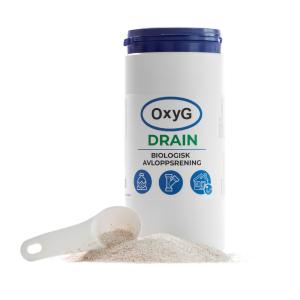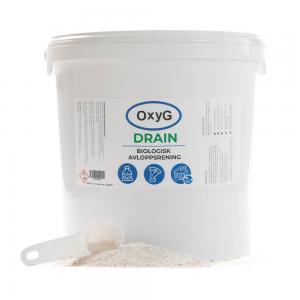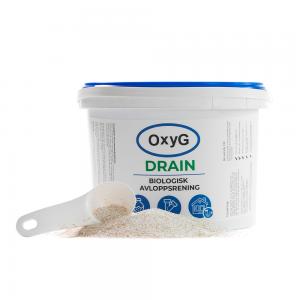- Totalt 0 kr
Septic tank
Effective Bacteria for wastewater systems
To be use in:
- Septic-tanks
- Treatment plants
- Gray water
- Black water
- Greace traps
- Liftpumps
- Infiltrations
- Leach fieds
- LPS systems
For best results, dose OxyG Drain at evening/ night when water flow is reduced to a minimum. Apply directly to sink drains, floor drains, toilets, or grease traps.
Dosage:
Sludge trap / Septic tank: 4 dimensions / adult / month
Treatment plant: 4 measures / adult / month
BDT drain: 1-2 measures / month
Pump well: 1 measure / week
Grease trap 4-6m3: 10 dimensions / week
leach field / infiltration: 4 measures / adult / month
House, villa, Permanent residence: Dosing takes place mainly monthly
Holiday homes: Dosing of a holiday home septic system is only done when the house is used. If the house is not used, no regular dosing is needed.
OxyG bacteria can help with any of these problems:
Do you have problems with the smell of sewage in the basement or garden?
Do you have problems with grease in the pipes in the House?
Do you have a mini treatment plant that smells?
Do you have a Treatment Plant that sludges again?
Do you have a sludge separator that smells?
Do you have an infiltration that smells in the vent?
Do you have an infiltration that works poorly?
Do you have problems with your grease or odor in your BDT drain?
Do you have problems with grease or odor in your LTA pump station?
Do you have problems with your grease separator
Benefits of using Drain
Odors coming from drains cease or are greatly reduced.
Breaks down sludge and grease.
Maintains infiltration.
Reduces sludge emptying.
Extends the life of sewer systems.
OxyG Drain is a product intended to be added to small wastewater with the intention of increasing the rate of degradation of the organic material of the wastewater. The product is a biological additive with a bacterial culture of soil bacteria of different Bacillus species according to the enclosed product leaf and a chemical oxidant, sodium percarbonate.
Slow decomposition of the organic material in a sewer system causes the sludge separator (septic tank) to fill and its task to separate or prevent solid material from the water. Thus, the solid particles will follow with the wastewater out of the sludge separator and impair the function in subsequent purification steps such as infiltration, soil bed or mini-treatment plant. In order to prevent problems in subsequent treatment steps, the sludge separator is often emptied every year with a truck. This is not only costly but it is also a great waste of resources in the form of fossil fuels. Usually the contents of the truck are emptied into municipal sewage treatment plants and the sludge from them is usually deposited on landfill due to dangerous chemicals and toxic heavy metals.
There are various ways to avoid frequent discharges of sludge separators(septic tank). An alternative is to install a larger sludge separator (septic tank), which is mainly relevant when a new sewage system is being built. Another alternative is to increase the rate of degradation of the organic material by creating a suitable environment for degrading microorganisms.
Benefits
- Removes bad odour in septic- tanks, liftstation, grease trap, graywater, blackwater, treatment palnts
- Infiltration - Heavily reduces sludge - Improves the function of a sewer system
- Prevents fat build-up in pipelines and tanks
- Break down grease, faeces and toilet paper
- Degrades household chemicals



